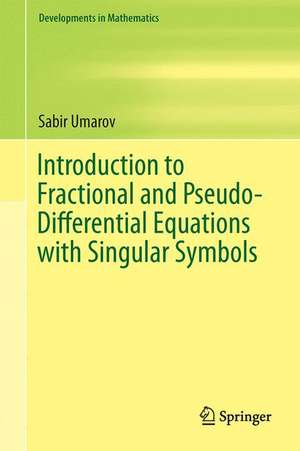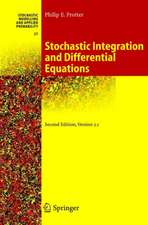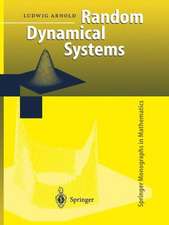Introduction to Fractional and Pseudo-Differential Equations with Singular Symbols: Developments in Mathematics, cartea 41
Autor Sabir Umaroven Limba Engleză Hardback – 27 aug 2015
| Toate formatele și edițiile | Preț | Express |
|---|---|---|
| Paperback (1) | 397.01 lei 6-8 săpt. | |
| Springer International Publishing – 22 oct 2016 | 397.01 lei 6-8 săpt. | |
| Hardback (1) | 404.67 lei 6-8 săpt. | |
| Springer International Publishing – 27 aug 2015 | 404.67 lei 6-8 săpt. |
Din seria Developments in Mathematics
- 18%
 Preț: 954.45 lei
Preț: 954.45 lei - 24%
 Preț: 746.63 lei
Preț: 746.63 lei - 18%
 Preț: 1193.25 lei
Preț: 1193.25 lei - 15%
 Preț: 482.17 lei
Preț: 482.17 lei - 9%
 Preț: 766.72 lei
Preț: 766.72 lei -
 Preț: 545.57 lei
Preț: 545.57 lei - 20%
 Preț: 633.29 lei
Preț: 633.29 lei - 20%
 Preț: 691.24 lei
Preț: 691.24 lei - 15%
 Preț: 647.08 lei
Preț: 647.08 lei - 15%
 Preț: 648.74 lei
Preț: 648.74 lei - 18%
 Preț: 958.38 lei
Preț: 958.38 lei - 18%
 Preț: 944.19 lei
Preț: 944.19 lei - 18%
 Preț: 960.78 lei
Preț: 960.78 lei - 18%
 Preț: 947.85 lei
Preț: 947.85 lei - 18%
 Preț: 948.61 lei
Preț: 948.61 lei - 15%
 Preț: 655.60 lei
Preț: 655.60 lei -
 Preț: 389.70 lei
Preț: 389.70 lei - 15%
 Preț: 643.48 lei
Preț: 643.48 lei -
 Preț: 381.81 lei
Preț: 381.81 lei - 18%
 Preț: 955.08 lei
Preț: 955.08 lei - 15%
 Preț: 578.87 lei
Preț: 578.87 lei - 15%
 Preț: 644.18 lei
Preț: 644.18 lei - 15%
 Preț: 636.30 lei
Preț: 636.30 lei - 18%
 Preț: 1105.19 lei
Preț: 1105.19 lei - 15%
 Preț: 637.46 lei
Preț: 637.46 lei - 18%
 Preț: 945.47 lei
Preț: 945.47 lei - 15%
 Preț: 646.11 lei
Preț: 646.11 lei - 18%
 Preț: 952.54 lei
Preț: 952.54 lei - 15%
 Preț: 646.62 lei
Preț: 646.62 lei
Preț: 404.67 lei
Nou
Puncte Express: 607
Preț estimativ în valută:
77.44€ • 82.80$ • 64.56£
77.44€ • 82.80$ • 64.56£
Carte tipărită la comandă
Livrare economică 17 aprilie-01 mai
Preluare comenzi: 021 569.72.76
Specificații
ISBN-13: 9783319207704
ISBN-10: 3319207709
Pagini: 434
Ilustrații: XVI, 434 p. 2 illus.
Dimensiuni: 155 x 235 x 29 mm
Greutate: 0.81 kg
Ediția:1st ed. 2015
Editura: Springer International Publishing
Colecția Springer
Seria Developments in Mathematics
Locul publicării:Cham, Switzerland
ISBN-10: 3319207709
Pagini: 434
Ilustrații: XVI, 434 p. 2 illus.
Dimensiuni: 155 x 235 x 29 mm
Greutate: 0.81 kg
Ediția:1st ed. 2015
Editura: Springer International Publishing
Colecția Springer
Seria Developments in Mathematics
Locul publicării:Cham, Switzerland
Public țintă
ResearchCuprins
Function Spaces and Distributions.- Pseudo-Differential Operators with Singular Symbols (DOSS).- Fractional Calculus and Fractional Order Operators.- Boundary Value Problems for Pseudo-Differential Equations with Singular Symbols.- Initial and Boundary Value Problems for Fractional Order Differential Equations.- Distributed and Variable Order Differential-Operator Equations.- Fractional Fokker-Planck-Kolmogorov Equations.- Random Walk Approximants of Mixed and Time-Changed Levy Processes.- Complex DOSS and Systems of Complex Differential Equations.- References.
Recenzii
“The book systematically presents the theory of pseudo-differential operators with symbols singular in dual variables. … The book is interesting both for probabilists and for researchers in those areas of functional analysis where pseudo-differential operators arise. The interesting connections are emphasized by a multitude of examples. Additional notes at the end of each chapter provide nice historical insights and help to understand the role of the presented results within the big picture.” (Alexander Schnurr, zbMATH 1331.35005, 2016)
Textul de pe ultima copertă
The book systematically presents the theories of pseudo-differential operators with symbols singular in dual variables, fractional order derivatives, distributed and variable order fractional derivatives, random walk approximants, and applications of these theories to various initial and multi-point boundary value problems for pseudo-differential equations. Fractional Fokker-Planck-Kolmogorov equations associated with a large class of stochastic processes are presented. A complex version of the theory of pseudo-differential operators with meromorphic symbols based on the recently introduced complex Fourier transform is developed and applied for initial and boundary value problems for systems of complex differential and pseudo-differential equations.
Caracteristici
A novel theory of pseudo-differential operators and equations with symbols singular in dual variables is presented systematically Recent developments in the theory of fractional order differential equations and their various applications are studied Fractional Fokker-Planck-Kolmogorov equations and their connection with the associated stochastic differential equations driven by a time-changed process are discussed in detail







